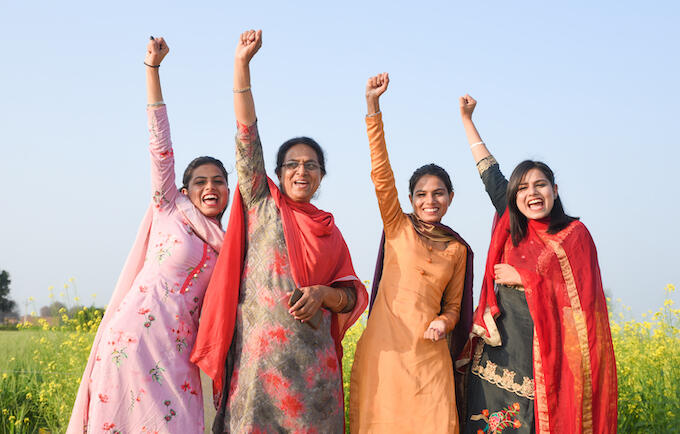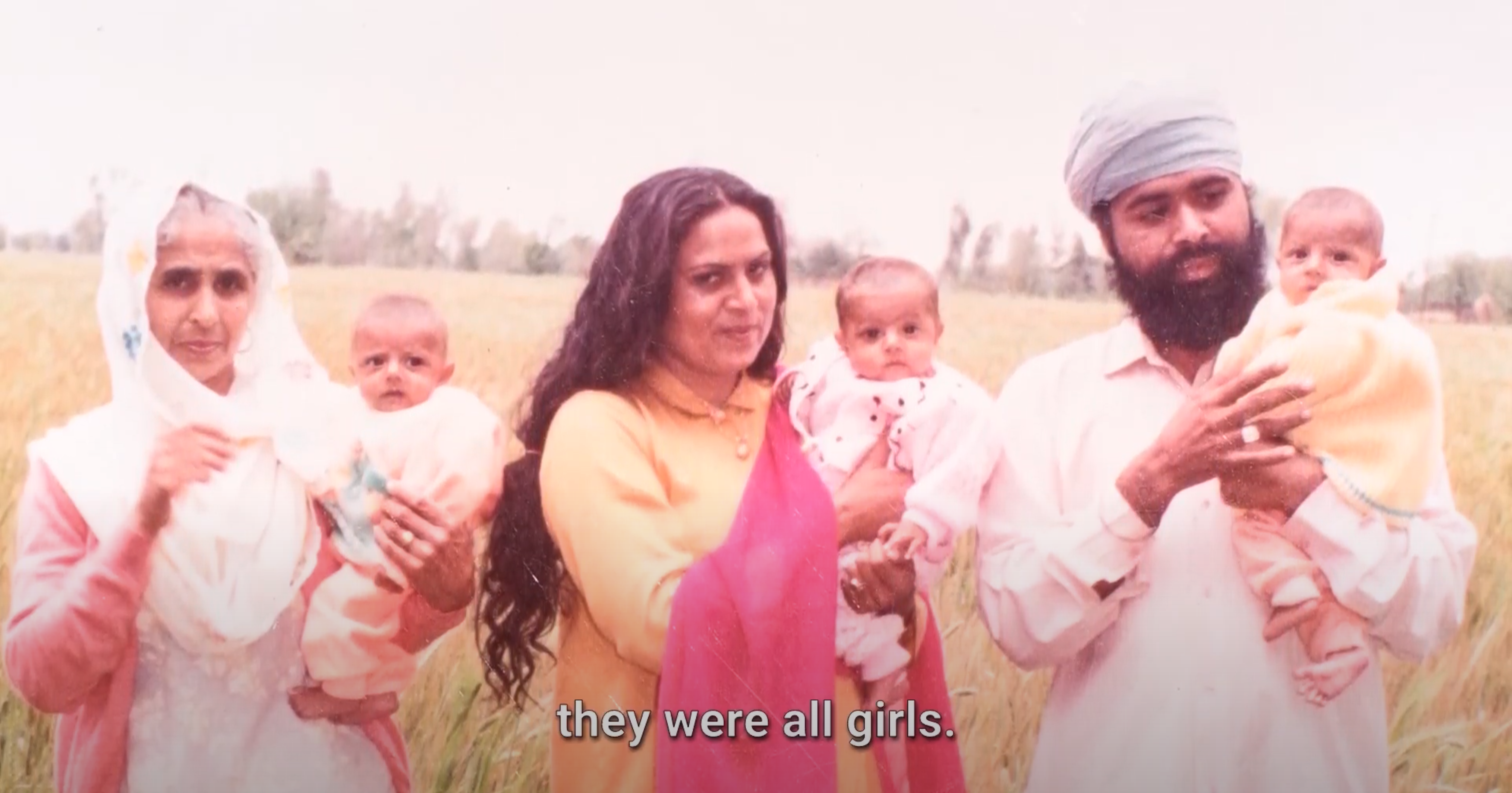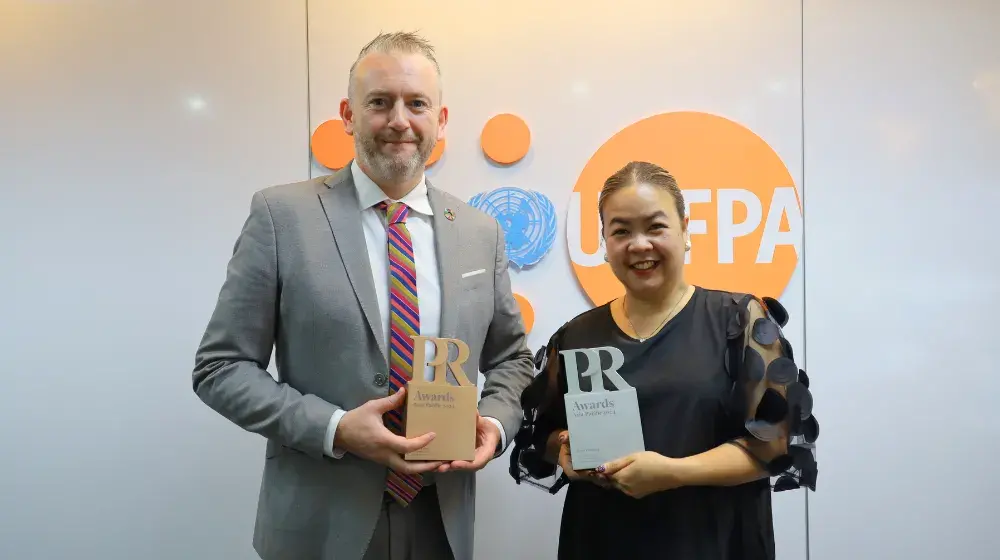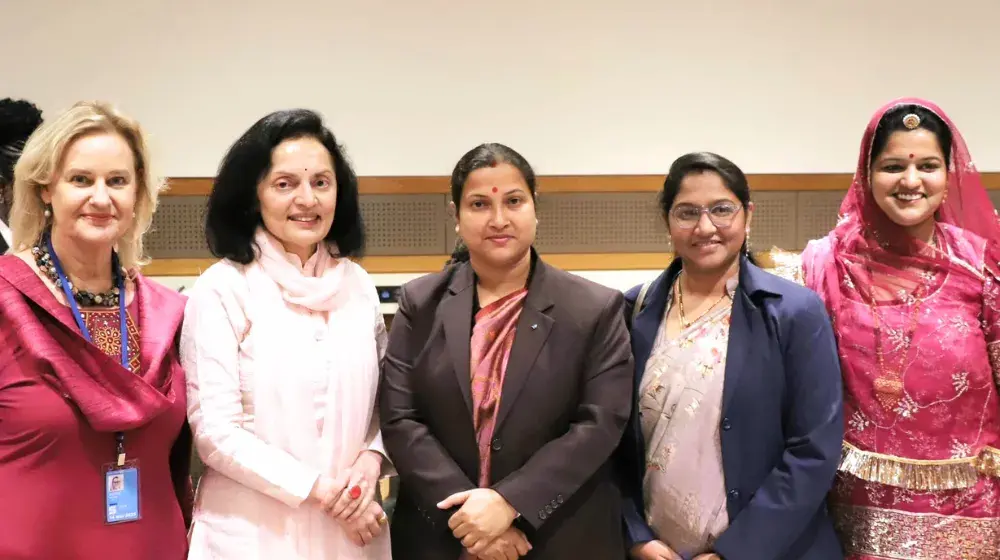Rajasthan, India - “My stomach was huge, so I knew that I was carrying more than one child. What I didn’t know was that they were going to be all girls,” 58-year-old Jasbeer Kaur says, smiling at her 23-year-old triplets, Mandeep, Sandeep and Pardeep Kaur as they huddle together in their tiny kitchen, preparing lunch.
“People here in my village often tell me, poor thing…you should have had at least one son instead of three daughters. And I tell them, spare me this rubbish! I am a woman and I am proud of having raised these girls who are now grown women,” Kaur says. “Then these people look at my daughters and when they see how bold they are they say, they are just like their mother!”
The three siblings laugh when their mother narrates this story. Over the years they’ve learned to see the lighter side of things, even though they’re acutely aware that their very existence is in so many ways, an anomaly.
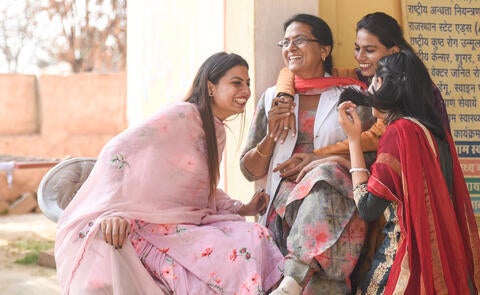
Image: Arvind Jodha/UNFPA India
Just a few months into her marriage, young Jasbeer Kaur realized that the man her parents had married her off to wasn’t someone she wanted to spend the rest of her life with. Her husband was an alcoholic who was rarely kind.
But things were about to get worse.
“I was pregnant and during one of the ultrasounds, the doctor told me I was having not one, but three children…three daughters. Now it is banned but, in those days they would tell you the sex of the child. The doctor offered to conduct an abortion, because she said it would be difficult for me to raise three daughters. She even explained that the procedure would be a straightforward one, similar to a delivery. For a few moments, I was scared, but God gave me strength to refuse and I said no,” Kaur recalls. “When I told my mother, she said, if I can raise daughters, so can you.”
But her husband and in-laws weren’t so supportive.
“No daughter had been born in my husband’s family in the last three generations. They told me, we won’t allow three daughters being born in the house at the same time. They gave me an ultimatum: Get an abortion or leave,” Kaur says.
She chose to leave. And never looked back.
It wasn’t easy raising and educating three children, but grit and determination were on her side. She worked as an auxiliary nurse midwife in India’s Rajasthan, earning a meagre salary that kept them afloat.
The triplets have done their mother proud.
Today, Sandeep is a make-up artist in Amritsar, with dreams of making it to Bollywood one day. Pardeep, after pursuing a degree in hotel management, is now interning with a five-star hotel. Mandeep is following in her mother’s footsteps; she is close to earning a degree in nursing.
“As kids, we would often wonder why our father never came for school functions like other fathers,” says Sandeep, “or why we would often see Mummy cry at home.”
“It’s only when we were much older that our aunt and grandmother told us the story of how we came to be born,” adds Pardeep. “That’s when it all began to make sense.”
“We are so very proud of what Mummy has been through,” says Mandeep. “But it’s not something we can talk about with our friends, because we know their immediate response will be one of pity which is something we don’t want from anyone.”
But in 36BB Village in Rajasthan’s Ganganagar District, pity is the last thing that comes to mind when neighbours speak about the Kaur family. In a society still largely obsessed with sons, Kaur is a living example all the local women cite with pride.
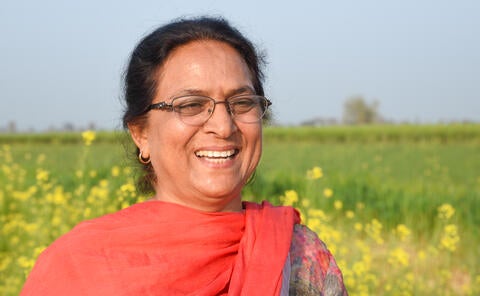
Image: Arvind Jodha/UNFPA India
“Here, people still think that you need a son, because without a son how can you carry forward the family’s name. You see, as a mother, you haven’t done your bit till you’ve given birth to a son,” explains Rajveer Kaur, a mother of two daughters. “But I think daughters are more important because they take more care of their parents than sons do. And if Jasbeer Kaur can raise three daughters on her own, why can’t we raise daughters when we enjoy our families’ support?”
A deeply entrenched preference for male children continues to prevail across the country. Despite sex-selection being banned, many families are still able to resort to abortion if they discover a woman is pregnant with a girl, leading to a highly skewed sex ratio at birth. After birth, girls face higher mortality rates than boys, an indication that they are facing discrimination in care.
Between 2001 and 2016, an average of 450,000 girls were “missing” at birth annually. According to an analysis based on numbers from the Indian census, approximately 34 per cent of girls went missing due to sex selection. The other 66 per cent were missing due to post-birth female mortality. Today, it is estimated that more than 460,000 girls are missing annually.
A single mother raising female triplets is a rarity anywhere, and particularly in rural Rajasthan. Kaur’s daughters know the hardships and stigmas their mother overcame, and they are determined to make her proud. They want to leave behind a legacy that honours her hard work.
“Today, people know us as Jasbeer Kaur’s daughters,” says Sandeep. “We want to make something of our lives…We want people to say, this is Jasbeer Kaur, she is Sandeep, Mandeep and Pardeep’s mother.”
VIDEO (above): Jasbeer Kaur and her daughters tell their story at their home in India
Videographer: Mauseen Khan | Editor: Abhishek Sharma | © UNFPA India
Learn more about combatting harmful practices, including this story, in “Against My Will,” UNFPA’s flagship State of World Population Report 2020, launched June 30.
Take an in-depth look at the drivers, consequences and ways forward to end child marriage, female genital mutilation, son preference and gender-biased sex selection once and for all.

